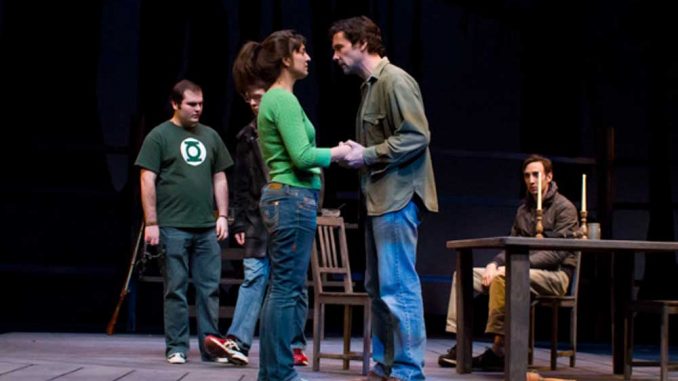
Before “The Crucible” could be found on Tim Dugan’s acting résumé, it could be found on the syllabus of his former students.
Dugan, a master’s of fine arts in acting candidate, played the role of high school teacher in his everyday life before coming to Temple and getting cast as John Proctor in “The Crucible” – a character on Dugan’s bucket list.
“This is one of those roles, as an actor, I would love to play,” Dugan said. “When I found out I got cast I was elated because I just knew I was going to get to spend months with this story and this character.”
“The Crucible,” opening tomorrow, March 27, at Tomlinson Theater, is a dramatization of the Salem Witch Trials in 1692.
Written as a commentary on the McCarthy trials, which questioned suspected communists – including playwright Arthur Miller included – “The Crucible” explores how a community handles heightened suspicion.
“I’m sure that when this play is taught, inevitably, the topic of McCarthyism and the blacklisting of many artists is addressed,” said David Mackay, the play’s director. “I think the thing to remember is that Arthur Miller challenged the government, by saying they were wrong. It’s easy to look back at events and see how civic and human rights were violated, and historically how some artists have commented on human unfairness. But Miller composed a passionate fable, based on historical facts, paralleled the play to current events, and challenged a fear-mongering government [initiative]. We could use a few more artistic watchdogs.”
At the center of the witch-hunt is Abigail Williams, the play’s antagonist, portrayed by Jackie DiFerdinando, a junior theater major.
“I did a lot of research on [“The Crucible”] and Puritan life, getting into that mindset,” DiFerdinando said. “In Puritan society women were looked down upon, they were lesser beings and had to obey their men. They had to be the dutiful little wife and listen to everything their husband or father said.”
In “The Crucible,” Williams has an affair with the married John Proctor. She also gets caught in the woods experimenting with “witchcraft” with some of her friends and her uncle’s slave. To avoid getting in trouble she lies and begins to name women she has “seen with the devil.”
“Throughout ‘The Crucible’ when she starts pointing out people for being witches, people are giving her a sense of power and she actually becomes a very powerful person in society,” DiFerdinando said.
Since Williams is a servant she is not used to having a sense of authority. Her desire for Proctor makes her accuse Proctor’s wife, Elizabeth, of being a witch. In another turn of events, Proctor eventually gets accused of witchcraft as well.
“[Elizabeth Proctor is] dealing with the fact her husband has been unfaithful to her, and then she is thrown into another situation where she has to defend her husband,” said Leah Walton, an MFA acting candidate who portrays Elizabeth Proctor.

Dugan adds, “It’s a scary time and a scary place when truth doesn’t matter. What are the factors that make a situation like this possible? How does it go from being this affair to this hysteria?”
Prior to this production of “The Crucible,” the theater department also put on the show in 1976 and again in 2000.
“It’s like a Shakespearean play, I think that’s why Shakespeare gets done so much,” Dugan said. “There are cycles of certain plays which get popular to do based on what’s going on in the world. I think this is one of those plays, and I hope it [continues to be] one of those plays that keeps getting cycled through.”
With four acts and a run time of three hours, the high-stake situations characters find themselves in help build the play’s momentum, he added.
“It’s well built; every character has a history and has stakes in this society,” Dugan said. “It’s just one of those stories where everything is [high stakes].”
Walton said she hopes audiences can make relevant connections to the show’s themes.
“The thing about an amazing play like ‘The Crucible’ is that it still has legs after so many years, and that’s what makes something a class,” Walton said. “It’s still important to today’s audiences.”
The Crucible runs March 27 through April 6.
Luis Fernando Rodriguez can be reached at luis.fernando@temple.edu or on Twitter @theluisfernando.


Be the first to comment